Below is a list of key publications that focus entirely, or mainly, on the development and application of the FairShares Model
Where available, click the title of the publication to download, access a PDF version, or obtain further information to order a book.
- Sheffield Hallam University (2021) Shaping the Praxis of Co-operative Social Entrepreneurship through the FairShares Model, 2021 REF Impact Case.
Summary: Research at Sheffield Hallam University, led by Ridley-Duff and in collaboration with the FairShares Association (FSA), has developed and operationalised the FairShares Model (FSM) of social enterprise. This research has underpinned the development of the FSM across 37 countries in Europe, Asia, Africa, North America and Oceania. The research challenges existing conceptions of wealth and value, and has influenced the design of more than 200 social enterprise projects. It has stimulated new thinking in social enterprise incubators to align consumer and worker interests in governance, ownership and profits; and promoted multi-stakeholder design principles and new conceptions of wealth. The research has influenced 150+ social entrepreneurs, six social enterprise incubators, 30+ social enterprise educators and promoted several legal innovations.
- Hilton, E. (2021) Exploring Organisational Ethics in Relation to the FairShares Model, FairShares Institute, Sheffield Hallam University.
This document includes a fascinating essay by Eleanor Rose Hilton, a student at Sheffield Hallam University, about a role play designed and developed by the FairShares Institute in Sheffield Business School. The essay describes the development and resolution of tensions during the role play. Students role played co-operative members as they considered a proposal to share intellectual property with housing groups. Eleanor’s work shows how participation in decision-making improved her knowledge of FairShares, and how this knowledge countered selfish behaviour by, and anger towards, Founder members. She describes how worker, customer and investor members supported the proposal, and effectively countered both their own, and founder members’, egoism.
- Boyd, G. and Reardon, J. (2020) Picasso and Einstein: The Economy, Leadership and You, Evolutesix Publications.
- Ridley-Duff, R., Schmidtchen, R. and 7 other authors (2020) Creating Social Enterprises in FairShares Labs, Sheffield: FairShares Association.
In this book, six partner organisations describe FairShares Labs for Social and Blue Innovation. They offer a vision of how to create social enterprise incubators that nurture inclusive multi-stakeholder co-operative enterprises. Building on the theory and practice of Living Labs, Social and Blue Economy and the FairShares Model the text of Creating Social Enterprises in FairShares Labs sets out the concepts, processes and methods for building a FairShares Lab.
Order from our FairShares Labs page. ![]()
- Nielsen, D., Grazzini, O., Lawson, Y. and Fuchs, E. (2019) The FairShares Model and Transformative Innovation: How Democratic Ownership Challenges Dominant Institutions, written in partial fulfilment of an MA Social Entrepreneurship, Roskilde University, Denmark. Abstract: This project takes a critical look at the democratic ownership structures present in the FairShares Model and the model’s potential for generating transformative social innovation. The project originated as a student project at Roskilde University’s Masters’ program on Social Entrepreneurship and Management. The analysis of democratic ownership is based on a matrix, developed for this project, that situates the FairShares model according to the level of embeddedness of democratic ownership and the broadness of participation in the ownership. The FairShares Model’s potential to generate transformative social innovation is assessed by using TRANSIT’s 13 principles of transformative social innovation, presented in their Manifesto for Transformative Social Innovation, as a benchmark against which the FairShares Model is compared. Finally, the project speculates on a combination of the FairShares Model and the concept of a commons, and how such a structure could resolve many of the contradictions present in capitalism today. In both regards, the FairShares Model shows an impressive commitment and potential. It has a relatively embedded democratic ownership model, especially compared to conventional company structures. It also features broad participation. Regarding transformative social innovation the FairShares Company model shows strong potential for generating this, based on its democratic ownership model and its position as an alternative to traditional company models.
- Ridley-Duff, R. and Bull, M. (2019) “Solidarity cooperatives: the (hidden) origins of communitarian pluralism in the UK social enterprise movement“, Social Enterprise Journal, DOI:10.1108/SEJ-12-2018-0078. [This publication is the most thorough paper on the pre-history of the FairShares Model. It examines the convergence and transition of ideas created by past social enterprise consultants/researchers, and the way these came together as a viable multi-stakeholder (solidarity) model for co-operative development].
- Ridley-Duff, R. and Wren, D. (2019) “Social Enterprise, Sustainable Development and the FairShares Model“, Japanese Journal of Human Welfare Studies, 11(1): 23-42.
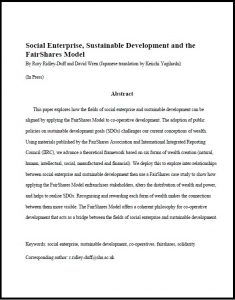 Abstract: This paper explores how the fields of social enterprise and sustainable development can be aligned by applying the FairShares Model to co-operative development. The adoption of public policies on sustainable development goals (SDGs) challenges our current conceptions of wealth. Using materials published by the FairShares Association and International Integrated Reporting Council (IIRC), we advance a theoretical framework based on six forms of wealth creation (natural, human, intellectual, social, manufactured and financial). We deploy this to explore inter-relationships between social enterprise and sustainable development then use a FairShares case study to show how applying the FairShares Model enfranchises stakeholders, alters the distribution of wealth and power, and helps to realise SDGs. Recognising and rewarding each form of wealth makes the connections between them more visible. The FairShares Model offers a coherent philosophy for co?operative development that acts as a bridge between the fields of social enterprise and sustainable development.
Abstract: This paper explores how the fields of social enterprise and sustainable development can be aligned by applying the FairShares Model to co-operative development. The adoption of public policies on sustainable development goals (SDGs) challenges our current conceptions of wealth. Using materials published by the FairShares Association and International Integrated Reporting Council (IIRC), we advance a theoretical framework based on six forms of wealth creation (natural, human, intellectual, social, manufactured and financial). We deploy this to explore inter-relationships between social enterprise and sustainable development then use a FairShares case study to show how applying the FairShares Model enfranchises stakeholders, alters the distribution of wealth and power, and helps to realise SDGs. Recognising and rewarding each form of wealth makes the connections between them more visible. The FairShares Model offers a coherent philosophy for co?operative development that acts as a bridge between the fields of social enterprise and sustainable development.
- Ridley-Duff, R. (2017). “The internationalisation of FairShares: where agency meets structure in US and UK company law”, in Boeger, N. and Villiers, C. (eds), Shaping the Corporate Landscape, Oxford: Hart Publishing.
Abstract: 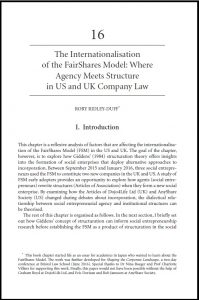 This chapter is a reflexive analysis of factors that are affecting the internationalisation of the FairShares Model (FSM) in the US and UK. The goal of the paper, however, is to explore how Giddens’ (1984) structuration theory offers insights into the formation of social enterprises that deploy alternative approaches to incorporation. Between September 2015 and January 2016, three social entrepreneurs used the FSM to constitute two new companies in the UK and US. A study of FSM early adopters provides an opportunity to explore how agents (social entrepreneurs) rewrite structures (Articles of Association) when they form a new social enterprise. By examining how the Articles of Dojo4Life Ltd (UK) and AnyShare Society (US) changed during debates about incorporation, the dialectical relationship between social entrepreneurial agency and institutional structures can be theorised.
This chapter is a reflexive analysis of factors that are affecting the internationalisation of the FairShares Model (FSM) in the US and UK. The goal of the paper, however, is to explore how Giddens’ (1984) structuration theory offers insights into the formation of social enterprises that deploy alternative approaches to incorporation. Between September 2015 and January 2016, three social entrepreneurs used the FSM to constitute two new companies in the UK and US. A study of FSM early adopters provides an opportunity to explore how agents (social entrepreneurs) rewrite structures (Articles of Association) when they form a new social enterprise. By examining how the Articles of Dojo4Life Ltd (UK) and AnyShare Society (US) changed during debates about incorporation, the dialectical relationship between social entrepreneurial agency and institutional structures can be theorised.
- McCulloch, M. and Ridley-Duff, R. (2016) ‘Beyond accounting for capitals: FairShares – a model for compensating capital contributions’, in Rethinking Capitals, published at https://www.icaew.com/en/technical/sustainability/rethinking-capitals/.
- Ridley-Duff, R. J. (2015). “The FairShares Model: an ethical approach to social enterprise development?”, Econviews – Review of Contemporary Economic, Entrepreneurship and Business Issues, 28(1): 43–66, ISSN 1847-2206.
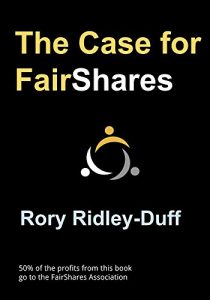 Ridley-Duff, R. J. (2015). The Case for FairShares: a new model for social enterprise development and the strengthening of the social and solidarity economy, Charleston: CreateSpace Independent Publishing Platform, 193p., ISBN 978-1512377668.
Ridley-Duff, R. J. (2015). The Case for FairShares: a new model for social enterprise development and the strengthening of the social and solidarity economy, Charleston: CreateSpace Independent Publishing Platform, 193p., ISBN 978-1512377668.
Abstract: Imagine a society in which every adult is entitled to co-own the organisations on which they, their family and their community depend… The FairShares Model is an approach to creating networks of solidarity enterprises. Every adult can become a member-owner, whether a founding entrepreneur, supplier, employee, customer, user or social investor. This book clearly sets out why we need FairShares, how to provide FairShares education and the legal templates for a new generation of social enterprises that apply FairShares values and principles.
Important Conference Papers on FairShares
- Ridley-Duff, R. and Bull, M. (2013) ‘The FairShares Model: a communitarian pluralist approach to constituting social enterprises?’, paper presented at the Institute of Small Business and Entrepreneurship, Cardiff, 4–6 November.
- Ridley-Duff, R. and Bull, M. (2014) ‘Solidarity co-operatives: an embedded historical communitarian pluralist approach to social enterprise development?’ paper presented at the RMIT Social Innovation and Entrepreneurship Colloquium (KeyNote presentation).
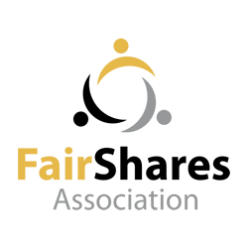
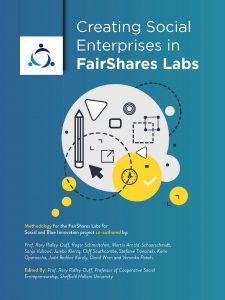
10 thoughts on “Publications”